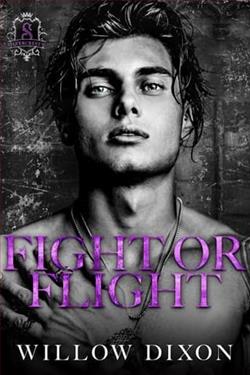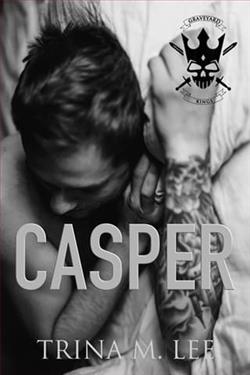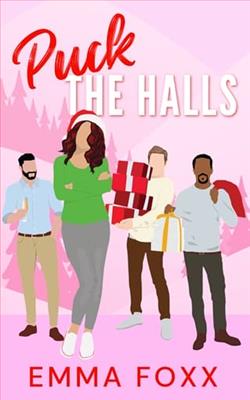Page 16 of Second Song
Once there, he lifts the lid on an old piano. “And this probably needs tuning.” He tidies away hymn books while I tap out a melody below a window. Only the padre and a stained-glass saint watch me play the accompaniment to a song I wrote for a contest finale but never got to sing in public. Now, I can’t stop playing this tune, and I have no idea why it’s easy to summon those notes here while being watched compared to at my last teaching placement. All I know is that an empty well fills inside me, one that this stressful day has depleted, and I feel…
“Better?” he murmurs from the doorway.
“Yes.” It’s true.
“I always feel that way here.”
I’m not sure if he means in the chapel or in the school in general. The piano is near a curtained alcove, so maybe that’s why what I say next feels like a confession. “I haven’t played in a church since coming back to England for teacher training.”
He hums as if interested while straightening a basket full of rolled-up rugs. Prayer mats, I realise.
“Do they belong in here?” I touch the frayed edge of an old curtain. “And this?”
“Depends who you ask,” he says just as easily as he’s answered each of my questions. “Glynn Harber welcomes children of all faiths. Or none. As long as they leave with faith in themselves and their community, this building serves its purpose.”
Our next stop is the only building so far that isn’t shabby. “Our art building,” he says while showing me some stellar paintings. “The first stage of an extensive rebuilding programme.” He doesn’t need to sell this school’s future to me. It’s already exciting, like the children’s artwork we leave behind, and his smile is a lopsided beam when I say so.
“I’ll tell our art master, Solomon, when he gets back from his trip with some of his sixth-form students.”
“Where are they?”
“In France. The school has close links with a refugee project. You already met one of its students, who has so much potential once he crosses a few personal hurdles.” He adds, “Or when he crosses some final bridges, I suppose,” and I guess which child he means. “That’s why some of our teachers and older students are with children on French beaches right now. The right or wrong of the crossings their families want to make don’t matter. Giving their children an education does, and art is universal, so we’re a bit thin on the ground until they’re home. Another six weeks and we’ll be back to full strength.”
Our tour next passes a sports hall as in need of renovation as that library, but the kids playing there don’t seem to care if most of the facilities are subpar. The padre explains why. “We have to balance rebuilding with making sure we offer as many free places as possible to students in trouble.” He adds something that plucks another tight string inside me. “Places for students who failed once already, like this school almost did. And like them, Glynn Harber has struggled but is ready to rise again.”
“Like a phoenix.”
“From ashes?” He nods. “Yes, so we can give even more children wings. Especially ones who don’t think they’ll ever get to fly. That means we need to train more educators how to meet those children exactly where they are, not where they should be according to a textbook or an exam schedule. Trainees like you, maybe.”
I touch that card tucked in my jacket pocket. It shows hope I can’t let myself feel.
Not yet.
Not until after our full circle brings us back to the car park and the padre says goodbye below those glinting windows. One window will belong to a headmaster’s study, I guess, a place a past version of me would have avoided. Now I hope I’ll be invited back so badly that my fists clench.
I let myself hold on to that hope a half hour later when I park again in that little fishing village.
That’s where I do my best not to clutch a card that will cut into my palm if I keep squeezing. I focus on not letting it go rather than on what it would feel like to be a winner for once.
What if the headmaster does call back? He promised he would.
That’s dangerously hopeful thinking. I’ve been here before, trusting when I shouldn’t. Besides, it’s Saturday tomorrow.
Will he even make work calls at the weekend?
At least I can kill time tomorrow by tracking down who else I need to see before leaving Cornwall.
I hold that thought until my bedroom door at the pub closes behind me. Then I sit on my bed, cradling that card, and let myself want it. Really want it. But only for a moment. Only for long enough so that hopeful drumming of my heart slows, and a different sound registers.
The bell over the door downstairs tinkles.
It tinkles for a second time a few minutes later, followed by footsteps climbing the stairs, which creak. So do the floorboards outside my bedroom. A quick knock comes next.
I open the door to find a chef holding out a carrier bag that swings between us. “Special delivery for you,” he says, his eyes merry. “From someone tall, dark, and surly who asked me to make sure you got it.” He leaves me, but not before making a suggestion. “He just left. You could catch him if you hurry.”
The stairs creak again and he’s gone, while I stand in my bedroom doorway and look in the bag to find a couple of items. The first is a container of hot chocolate, and that drumming in my chest picks up, banging away even faster when I unwrap tissue paper to find my glasses. I try them on, and apart from a few scuffs, they’re undamaged. Spared like I was. Or saved by a real-life action hero.
I dart to my bedroom window, which overlooks the harbour, and there’s mine.















